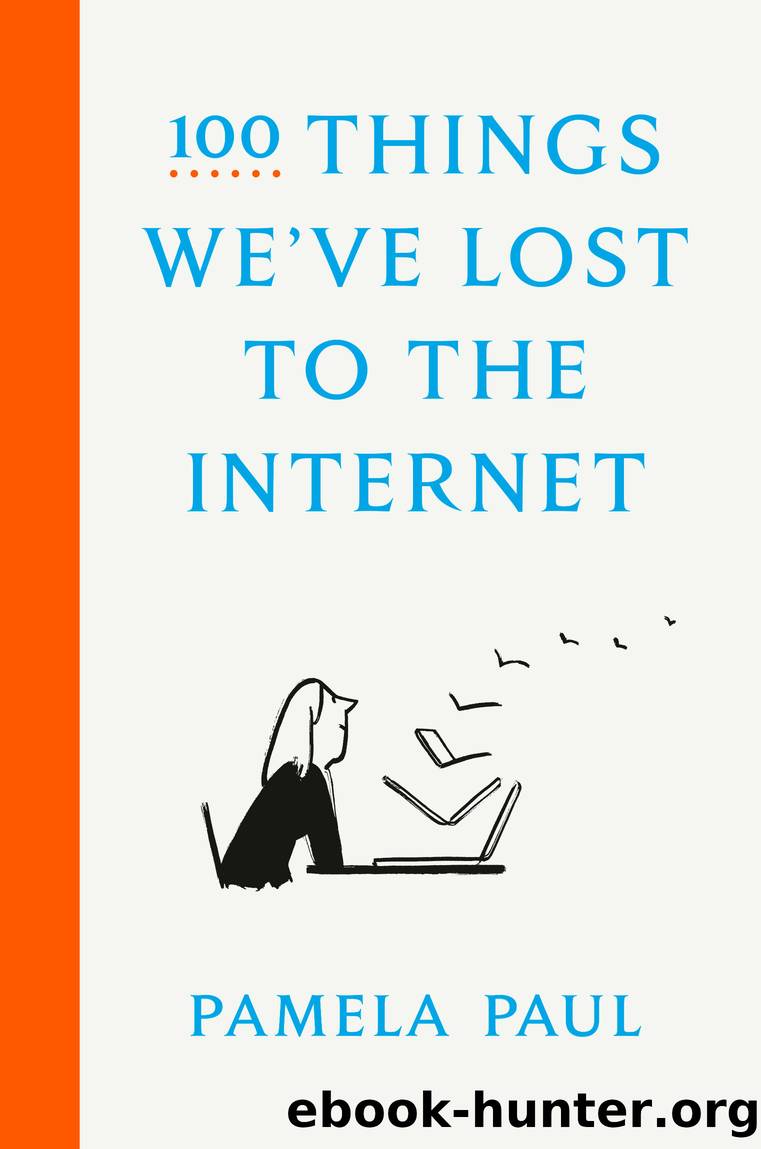100 Things We've Lost to the Internet by Pamela Paul

Author:Pamela Paul [Paul, Pamela]
Language: eng
Format: epub
Publisher: Crown
Published: 2021-10-26T00:00:00+00:00
[ 48 ]
CIVILITY
Goodbye, dear. Actually, goodbye âdear.â This auntie-scented nicety of a word, the one that used to signal the beginning of any decent-minded letter, has been lopped off the top of emails, texts, Slack conversations, and other online correspondence, just as atavistic epistolary sign-offs like âBest,â âSincerely,â and âYoursâ no longer wrap things up at the end. So, too, go our titles and our given names, a waste of precious thumbwork. (Who else would be reading it?) The utility-minded Internet weeds out the extraneous.
With those lost words of personal acknowledgment and endearment, we also lose the insulating effects of kindness andâforgive the old-fashioned termâcivility, two virtues that were already in jeopardy, victims of the increase in partisanship and the general coarsening of culture. Our online lingo, with its casual-to-dismissive terminologies, not only reflects that decline but also pushes it not-so-gently along.
Itâs easy to lose your manners online. People who would at least hesitate before yelling at their kid in person quickly resort to the ALL CAPS version in text (ARE YOU THERE!?! ANSWER ME!). Colleagues who have never met in person feel free to unleash on one another in a âprivateâ channel. Have you ever been spoken to more viciously than you have on social media or been so vigorously upbraided for the merest of slights? Itâs not just everyone else; letâs be honest, itâs us, too. Even within the confines of a text, have you sarcastically responded to someone else in a way youâd never dare to in person? You have.
Among the unhappiest workers in the Internet economyâand between the Uber drivers and food app delivery people and the warehouse managers, the competition is stiffâare the comment moderators. Imagine being forced to tune in to this negativity all day: the attacks, the complaints, the loaded encounters and threats, not only from dedicated trolls but also from the mentally unstable and from the people just having a crappy morning. They are exposed all day to everyone elseâs spleen. These employees describe burnout, depression, anxiety, and the ongoing toll of stress as the daily baseline of their jobs, interspersed with jolts of anomie, misanthropy, and indifference.
The Internet was never intended to work this way. It was supposed to open people up to self-expression and connection. It was supposed to allow people to show who they really were or, under the cloak of anonymity, to break free from who others expected them to be. The Internet was meant for strangers to exchange freely with one another and in good faith. In a speech at Davos in 1996, the late poet and cyberactivist John Perry Barlow said, âWe are creating a world that all may enter without privilege or prejudice accorded by race, economic power, military force, or station of birth. We are creating a world where anyone, anywhere may express his or her beliefs, no matter how singular, without fear of being coerced into silence or conformity.â The bitter irony is that rather than bring us together into any kind of Kumbaya, the fraught setting of the Internet pits us against one another.
Download
This site does not store any files on its server. We only index and link to content provided by other sites. Please contact the content providers to delete copyright contents if any and email us, we'll remove relevant links or contents immediately.
| Africa | Americas |
| Arctic & Antarctica | Asia |
| Australia & Oceania | Europe |
| Middle East | Russia |
| United States | World |
| Ancient Civilizations | Military |
| Historical Study & Educational Resources |
Machine Learning at Scale with H2O by Gregory Keys | David Whiting(4313)
Never by Ken Follett(3957)
Fairy Tale by Stephen King(3399)
Oathbringer (The Stormlight Archive, Book 3) by Brandon Sanderson(3217)
The Man Who Died Twice by Richard Osman(3081)
Will by Will Smith(2920)
Rationality by Steven Pinker(2366)
Can't Hurt Me: Master Your Mind and Defy the Odds - Clean Edition by David Goggins(2342)
The Dark Hours by Michael Connelly(2311)
Friends, Lovers, and the Big Terrible Thing by Matthew Perry(2230)
The Dawn of Everything: A New History of Humanity by David Graeber & David Wengrow(2210)
Principles for Dealing With the Changing World Order: Why Nations Succeed and Fail by Ray Dalio(2055)
A Short History of War by Jeremy Black(1848)
HBR's 10 Must Reads 2022 by Harvard Business Review(1845)
Go Tell the Bees That I Am Gone by Diana Gabaldon(1758)
A Game of Thrones (The Illustrated Edition) by George R. R. Martin(1746)
Kingdom of Ash by Maas Sarah J(1684)
515945210 by Unknown(1668)
443319537 by Unknown(1560)
